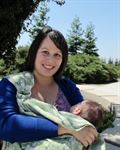
 Catalina Hernandez, UC Merced’s first Human Rights Center fellow, is spending this summer exploring how women decide to seek help from a midwife for childbirth instead of an obstetrician.
Catalina Hernandez, UC Merced’s first Human Rights Center fellow, is spending this summer exploring how women decide to seek help from a midwife for childbirth instead of an obstetrician.
A proponent of midwifery, Hernandez said allowing women to choose their maternity care is a human-rights issue that goes beyond race or class. The pop-culture image of childbirth — a screaming mother in a hospital – distorts people’s perspectives, she said.
“The birth culture in the United States is so complicated and so negative,” said Hernandez, a homebirth mother of three.
This is the first year UC Merced has a human rights fellow. Part of the mission of UC Berkeley’s Human Rights Center is “to train students and advocates to document violations of human rights and to turn this information into effective action.”
Of the 4 million children born in the United States in 2009, the National Vital Statistics Reports showed midwives delivered 8 percent. The federal government also reported that cesarean sections reached an all-time high of 32 percent of all births. The rate has increased for 13 consecutive years.
Hernandez is interviewing between 50 and 75 women across the country about what led them to use midwives for childbirth instead of obstetricians. She plans to use the information from her study to develop education initiatives that empower women to get informed about their birth options.
“Women can’t advocate for rights they don’t even know they have,” Hernandez said. “Childbirth is a pivotal moment in a women’s life, and there’s so much that goes on psychologically.”
Hernandez said the United States’ increased use of medical interventions — especially C-sections — has led to high morbidity and mortality rates. The United States has 5.98 deaths for every 1,000 live births, according to the CIA’s World Factbook. The United States has an infant mortality rate worse than the United Kingdom, Japan, Germany and other countries, despite steep increases in the amount of money spent on health care.
Norway has only 3.50 deaths for every 1,000 live births. It has 319 nurses/midwives for every 10,000 residents, the highest rate in the world, according to the World Health Organization. The United States has 98 nurses/midwives for every 10,000 residents.
Hernandez said there is a nationwide push to prohibit midwives from practicing, and several states have already enacted laws that make midwifery illegal.
“The midwifery model of care has been repeatedly proven to be safer than the obstetric model of care, and it is what the rest of the world relies on,” Hernandez said. “This becomes a human rights issue because women’s birth options are taken away, leaving them with a model of maternity care that is increasingly hazardous to the health of both mother and baby.”
A literature and cultures major, Hernandez plans to graduate with her bachelor’s degree in 2014, and continue her research in maternity care by pursuing a graduate degree in sociocultural anthropology.
Hernandez’s fellowship was funded by the dean of the School of Social Sciences, Humanities and Arts. Her work is also being supported by the Ronald E. McNair Scholars Program.
UC Merced literature Professor Nigel Hatton organized the campus’s participation in the fellowship program because he wants to further develop the campus’ human rights focus.
The campus already has the Violence Prevention Program, the annual Human Rights Film Festival as well as student groups focused on the topic.
“UC Merced and the faculty across the disciplines are addressing issues that relate to human rights,” Hatton said. “The focus on human rights is constantly building.”






